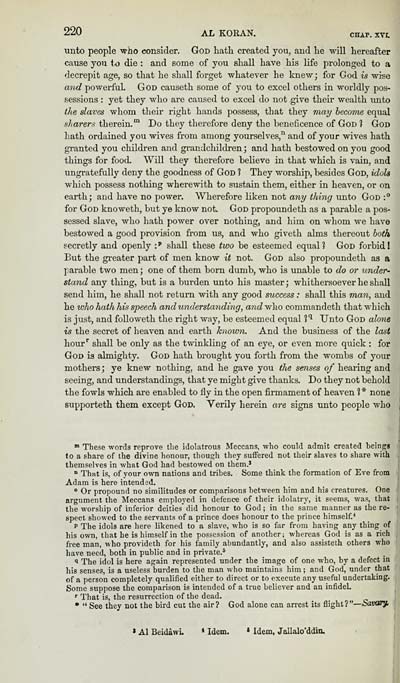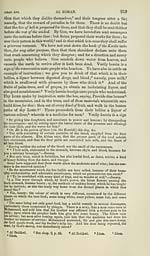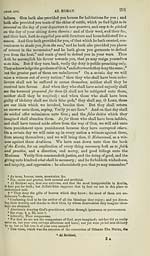Download files
Complete book:
Individual page:
Thumbnail gallery: Grid view | List view

220 AL KORAN. CHAP. XVL
unto people who consider. God hatli created you, and he will hereafter
cause you to die : and some of you shall have his life prolonged to a
decrepit age, so that he shall forget whatever he knewj for God is wise
and powerfuL God causeth some of you to excel others in worldly pos-
sessions : yet they who are caused to excel do not give their wealth unto
the slaves whom their right hands possess, that they may become equal
sharers therein.™ Do they therefore deny the beneficence of God ? God
hath ordained you wives from among yourselves," and of your wives hath
granted you children and grandchildren ; and hath bestowed on you good
things for food. Will they therefore believe in that which is vain, and
ungratefully deny the goodness of God ? They worship, besides God, idols
which possess nothing wherewith to sustain them, either in heaven, or on
earth; and have no power. Wherefore liken not any thing unto God ■."
for God knoweth, but ye know not. God propoundeth as a parable a pos-
sessed slave, who hath power over nothing, and him on whom we have
bestowed a good provision from us, and who giveth alms thereout both
secretly and openly : ■* shall these two be esteemed equal ? God forbid I
But the gi-eater part of men know it not. God also propoundeth as a
]~arable two men; one of them born dumb, who is unable to do or under-
stand any thing, but is a burden unto his master ; whithersoever he shall
send him, he shall not return with any good success : shall this man, and
he who hath hi'i speech and understanding, aric/who commandeth that which
is just, and followeth the right way, be esteemed equal ?'^ Unto GoD alone
is the secret of heaven and earth known. And the business of the last
hour'' shall be only as the twinkling of an eye, or even more quick : for
God is almighty. God hath brought you forth from the wombs of your
mothers ; ye knew nothing, and he gave you the senses of hearing and
seeing, and understandings, that ye might give thanks. Do they not behold
the fowls which are enabled to fly in the open firmament of heaven ? * none
Bupporteth them except God. Verily herein are signs unto people who
» These words reprove the idolatrous Meccans, who could admit created beings
to a share of the divine honour, though they suffered not their slaves to share with
themselves in what God had bestowed on them.'
" That is, of your own nations and tribes. Some think the formation of Eve from
Adam is here intended.
" Or propound no similitudes or comparisons between him and his creatures. One
argument the Meccans employed in defence of their idolatry, it seems, was, that (
the worship of inferior deities did honour to God ; in the same manner as the re- <
spect showed to the servants of a prince does honour to the prince himself.*
P The idols are here likened to a slave, who is so far from having any thing of j
his own, that he is himself in the possession of another; whereas God is as a rich )
free man, who provideth for his family abundantly, and also assisteth others who '
have need, both in public and in private.*
1 The idol is here again represented under the image of one who, by a defect in
his senses, is a useless burden to the man who maintains him ; and God, under that
of a person completely qualified either to direct or to execute any useful undertaking.
Some suppose the comparison is intended of a true believer and an infidel.
"■ That is, the resurrection of the dead.
* " See they not the bird cut the air? God alone can arrest its flight?" — Savamj.
* Al BeidawL * Idem. » Idem, Jallalo'ddin.
unto people who consider. God hatli created you, and he will hereafter
cause you to die : and some of you shall have his life prolonged to a
decrepit age, so that he shall forget whatever he knewj for God is wise
and powerfuL God causeth some of you to excel others in worldly pos-
sessions : yet they who are caused to excel do not give their wealth unto
the slaves whom their right hands possess, that they may become equal
sharers therein.™ Do they therefore deny the beneficence of God ? God
hath ordained you wives from among yourselves," and of your wives hath
granted you children and grandchildren ; and hath bestowed on you good
things for food. Will they therefore believe in that which is vain, and
ungratefully deny the goodness of God ? They worship, besides God, idols
which possess nothing wherewith to sustain them, either in heaven, or on
earth; and have no power. Wherefore liken not any thing unto God ■."
for God knoweth, but ye know not. God propoundeth as a parable a pos-
sessed slave, who hath power over nothing, and him on whom we have
bestowed a good provision from us, and who giveth alms thereout both
secretly and openly : ■* shall these two be esteemed equal ? God forbid I
But the gi-eater part of men know it not. God also propoundeth as a
]~arable two men; one of them born dumb, who is unable to do or under-
stand any thing, but is a burden unto his master ; whithersoever he shall
send him, he shall not return with any good success : shall this man, and
he who hath hi'i speech and understanding, aric/who commandeth that which
is just, and followeth the right way, be esteemed equal ?'^ Unto GoD alone
is the secret of heaven and earth known. And the business of the last
hour'' shall be only as the twinkling of an eye, or even more quick : for
God is almighty. God hath brought you forth from the wombs of your
mothers ; ye knew nothing, and he gave you the senses of hearing and
seeing, and understandings, that ye might give thanks. Do they not behold
the fowls which are enabled to fly in the open firmament of heaven ? * none
Bupporteth them except God. Verily herein are signs unto people who
» These words reprove the idolatrous Meccans, who could admit created beings
to a share of the divine honour, though they suffered not their slaves to share with
themselves in what God had bestowed on them.'
" That is, of your own nations and tribes. Some think the formation of Eve from
Adam is here intended.
" Or propound no similitudes or comparisons between him and his creatures. One
argument the Meccans employed in defence of their idolatry, it seems, was, that (
the worship of inferior deities did honour to God ; in the same manner as the re- <
spect showed to the servants of a prince does honour to the prince himself.*
P The idols are here likened to a slave, who is so far from having any thing of j
his own, that he is himself in the possession of another; whereas God is as a rich )
free man, who provideth for his family abundantly, and also assisteth others who '
have need, both in public and in private.*
1 The idol is here again represented under the image of one who, by a defect in
his senses, is a useless burden to the man who maintains him ; and God, under that
of a person completely qualified either to direct or to execute any useful undertaking.
Some suppose the comparison is intended of a true believer and an infidel.
"■ That is, the resurrection of the dead.
* " See they not the bird cut the air? God alone can arrest its flight?" — Savamj.
* Al BeidawL * Idem. » Idem, Jallalo'ddin.
Set display mode to: Large image | Transcription
Images and transcriptions on this page, including medium image downloads, may be used under the Creative Commons Attribution 4.0 International Licence unless otherwise stated. ![]()
| Early Gaelic Book Collections > J. F. Campbell Collection > Koran: or, Alcoran of Mohammed > (374) |
|---|
| Permanent URL | https://digital.nls.uk/77138209 |
|---|
| Description | Volumes from a collection of 610 books rich in Highland folklore, Ossianic literature and other Celtic subjects. Many of the books annotated by John Francis Campbell of Islay, who assembled the collection. |
|---|
| Description | Selected items from five 'Special and Named Printed Collections'. Includes books in Gaelic and other Celtic languages, works about the Gaels, their languages, literature, culture and history. |
|---|

